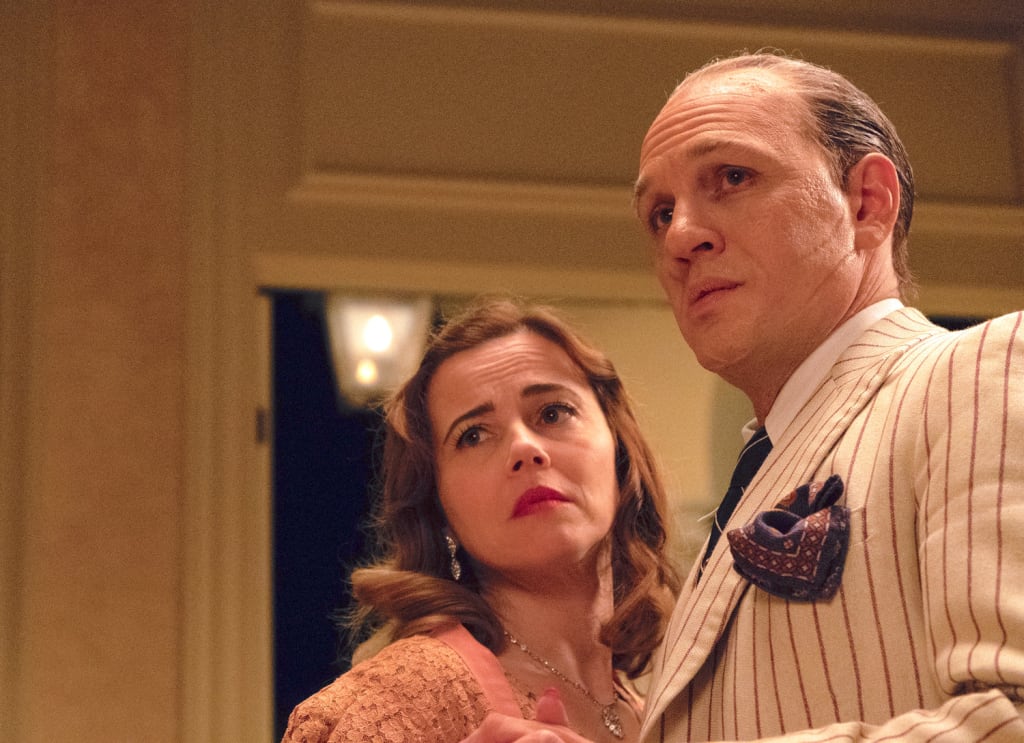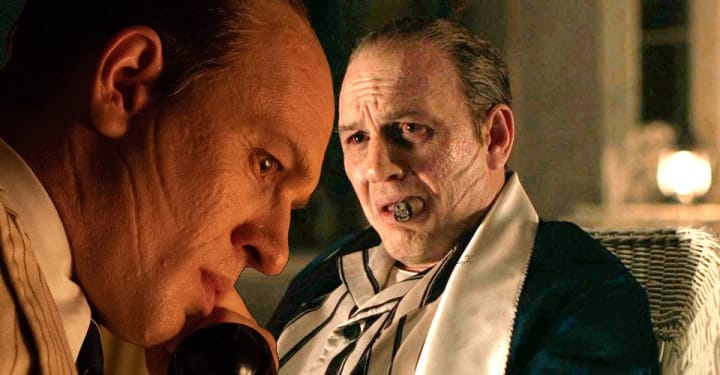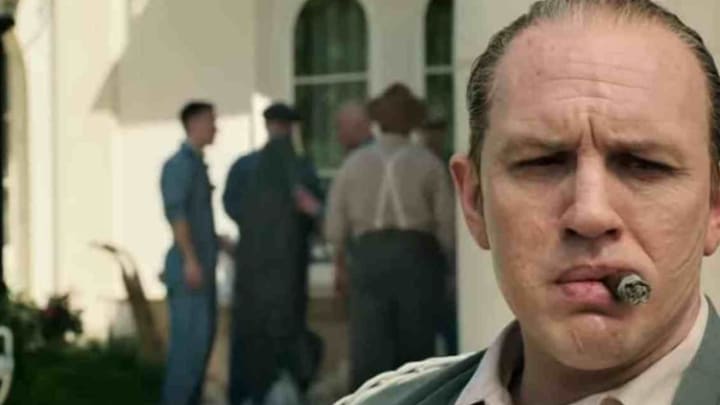More Credit for 'Capone'
the brilliant subtext of Tom Hardy's max method

Streaming this month on Amazon Prime was Capone, a film that critics hacked into like one of the renowned gangster lord’s cigar cutters. And while I can certainly agree that there was a lot more the film could have shown (I remember finishing it the first time thinking, “That could have been a lot better”), the reason that what it accomplished has gone largely unappreciated is because it wasn’t what people expected from a film named after Scarface himself. It was not an action film, but a dark, psychological drama about the horrors of physical and mental degradation.
Director Josh Trank admitted that the harsh ratings didn’t bother him in the slightest this time:
“Weirdly, I couldn’t be more thrilled with that… The things that people don’t like about it are the same things that other people like about it.”
Tom Hardy certainly does not appear the way you would assume, either. Beneath layers of pale, chalky make-up, bloodshot eyes, cockatoo hair standing up in the back from a receding hairline, Hardy’s Capone has all the look of Frankenstein’s monster, not a 48-year old man. And he sounds it, too. In the opening scene, he chases children around the house in hide-and-go-seek at Thanksgiving, roaring and lumbering about in the rain and the mud like something out of a science lab.
Fun fact from Amazon Prime: This is Tom Hardy’s second attempt at playing Al Capone. He was previously going to play the character in a film called Cicero, directed by David Yates, but the project never moved forward. He is also the second English actor to portray Al Capone. The first was Stephen Graham, who portrayed Capone in the HBO series Boardwalk Empire (2010).
Hardy has become an actor who, like his The Dark Knight Rises costar, Christian Bale, no one ever quite remembers what he really sounds like. If you had to use subtitles to hear Bane, you’ll need them to hear Capone. Coupled with the intense staring from Mad Max: Fury Road and the mumbling in The Revenant, this portrayal is far from his suave style of the British Kray twins in Legend. This Capone garbles, growls, and grunts his way through every line (the most popular of which is a basic “yeah” response to everything).
If you use subtitles, though, you’ll miss the nuance of this character’s situation (not to mention gems like the hilarious pronunciation of “platypus” when he shows the animal he’s drawn as part of his physical therapy following a second stroke). Unlike the soft mutterings of Marlon Brando’s Don Vito Corleone, Capone is rough and ragged. Corleone had you leaning in to hear every word because of the respect he commanded. He didn’t have to speak up to be obeyed. The tone of voice was more dangerous than the words he spoke. For Capone, though, it’s as though he’s fighting to hold on to that respect he once had. He growls repeatedly and then bursts out in shouting Italian rampages in a manner that is just as dangerous. It doesn’t matter if you can’t understand every syllable. He is still telling you he will take your head off. Because he still believes he can.

While no known audio recordings of Al Capone exist, Trank and Hardy worked together for months to develop the sound they envisioned of the common Italian-American Brooklynese. According to Trank, Hardy was the perfectionist:
“He would send me digital voice notes, trying out different versions of the voice so we could find it together… Tom is extremely skilled at keeping himself in control. A century ago, he could have been a circus performer or something. Or a mime. He can make himself seem bigger or smaller by holding his body a certain way. The same goes for his command of his voice. He can do so many different kinds of voices and accents it’s incredible.”
The way that Hardy holds in his shoulders, he stoops and carries a figure of a man who once stood tall and large. Now, he’s shriveled and diminutive in size. If you squint, though (like the character himself frequently does), you can imagine how impressive he once was and how others still remember him. There's something dangerous in that glare. Everything in the appearance, including the voice, is a part of the deeper characterization.
Capone has lost everything. His mind replays things he wishes he could forget as well as things he wishes he could remember, like where he stashed away $10 million. He frequently sits on the back porch watching the landscapers pack up his grandiose garden statues of Roman gods and soldiers and Caesars. Everything is covered up with sheets and removed to be sold, to try and gain a little money. He sits, helpless, and watches his life disappear, watches FBI agents on the other side of the water spying on him in his private retirement. He sits waiting to be covered up and taken away, himself. As he forgets more and more, he becomes paranoid of this, that those closest to him are betraying him, just waiting for him to die. But he will not go quietly.
He screams at the spying FBI agents, shouting in Italian, “Serpents! I see you! I see you!” He glares at the gardener, whose identity he’s forgotten, telling him that he’ll cut his head off if he takes away his Lady Atlas statue. He tells his friend, Johnny Torrio, played by Matt Dillon, that he’ll "put him in the ground." He grows paranoid of his old associate Gino, whispering in Italian about “assassins” and “murderers,” before leaping from the table suddenly and shouting for everyone to “save themselves.” He goes fishing and when an alligator steals his catch and his rod, he blows it away with a shotgun he pulled out of nowhere, calling the gator a bum and asking it, “Was it worth it?” He loses control of his bowels and bladder frequently. Too frequently, constantly grumbling, "oh no." He ambles around his property and the insulting moving trucks there while he wears a bathrobe and diaper, chews his carrot cigar, and wields a gold-plated Tommy gun. Everything about him is a sense of waiting to see what he will do next.
All of this is hysterical and yet incredibly difficult to watch. Linda Cardellini plays his wife, Mae, and her constant presence reflects the incredible burden of watching the one you love slowly disappear. His outbursts become more and more unpredictable, and in this, his former glory is simply a tragic temper. Mae and others disregard him, telling him to sit down and stop yelling, sighing like he’s a troublesome child to be looked after. He doesn’t even have his own name anymore. The name “Al” is forbidden in the Florida house, and he’s referred to only as “Fonse.” (Ultimately, most of his family would even change their names in order to start over.) People watch him in pity—a look he’s not used to. He is given carrots to chew on instead of cigars in an attempt to save his health at all costs. The King of Chicago sits drooling over a carrot stick while he watches everything slip away.
Josh Trank loosely associated with this descent, describing the inspiration behind the film in an interview with Vanity Fair:
“After weeks and weeks and weeks of just repetitively sitting and meditating on everything, I remembered that time of Al Capone’s life after Alcatraz, where he was sitting, himself, in his backyard, in a near vegetative state with nothing to do other than reflect on his own self-inflicted trauma—and personal memories haunting him in a way where he could not differentiate between what was real and what wasn’t… It’s not that I saw a literal parallel [between my life and Capone’s], but I felt like there’s something about that I could step into and write about.”
This film isn’t about a gangster lord as much as it is about a once great man who is only a shell of his former self. (You can do horrible things and still be great—think Voldemort: “He Who Must Not Be Named did great things. Terrible. But great.” And is the sight of him not wretched in The Deathly Hallows, Part II, where the small, shriveled form curls moaning under the bench?) It is darkly psychological. The violin strings in the trailer alone give the aura of a psychological thriller film, not an action film. It’s about being pulled under by your own mind. Like the gators in the water he finds himself with in one vision, he and everything unique about this film is under the surface. We too, as viewers, have to be willing to go under the surface.
Trank and Hardy saw something special in this project that appealed to them, and making it happen was success enough. I liken it to many of Val Kilmer’s later projects. One of my favorite actors, he is often underrated because of these smaller, B-films that didn’t make sense to critics as he too, was in a sense “blacklisted” from Hollywood for a time. The films he participated in, though, meant something to him. He saw something in the character that appealed to him and he went after it. In Capone, that’s exactly what Trank and Hardy did.
“One thing we both were in lockstep about going into this thing was we’re going to make big choices,” said Trank. “We’re going to go big. We’re not going to be afraid to fail. And we’re going to do things that are going to pop. There are elements to it that are completely goofy or schlocky or weird, with slow pacing, that are somewhat of a challenge for the viewer to engage in on their own terms — if they want to do that. That’s a movie I want to watch. And that’s a movie Tom had been wanting to do for a while.”
In the end, then, it’s not a film you can watch like you can watch The Godfather, Goodfellas, The Irishman, Casino, or any of those other iconic projects you might think of. The name Al Capone might make it seem as if a film about him should be automatically in that category. But this story is decidedly different. And therein lies its best nuance: underneath everyone, no matter what you did in life, there is just memory and loss and the undiscriminating darkness that awaits.
Even if your name is Alphonse Gabriel Capone.

About the Creator
Bryana Fern
English major who never left college. Lover of Victorian novels, Ravenclaw, and Rivendell. Teaching applications at Hogwarts and Starfleet Academy still pending. Find me on Instagram @coffeenerd.writer and Twitter @bryanafern






Comments
There are no comments for this story
Be the first to respond and start the conversation.